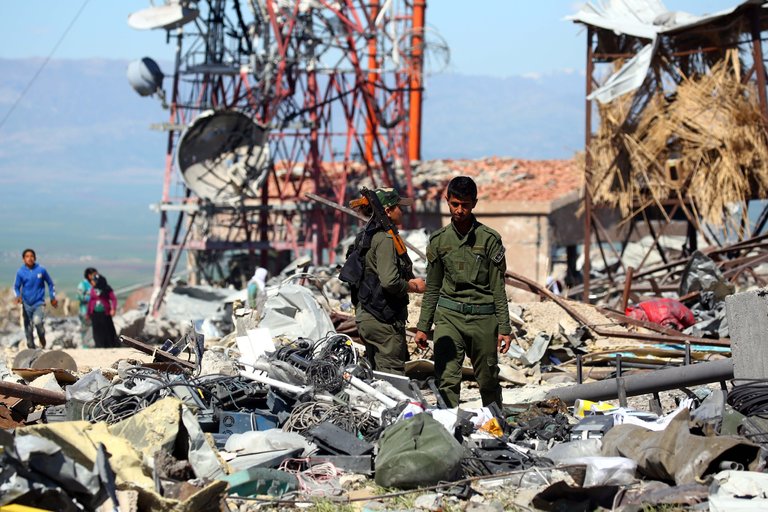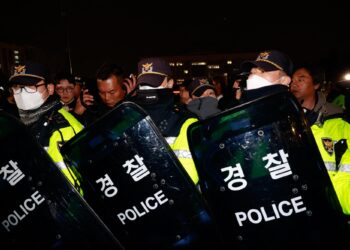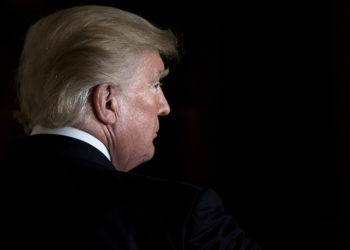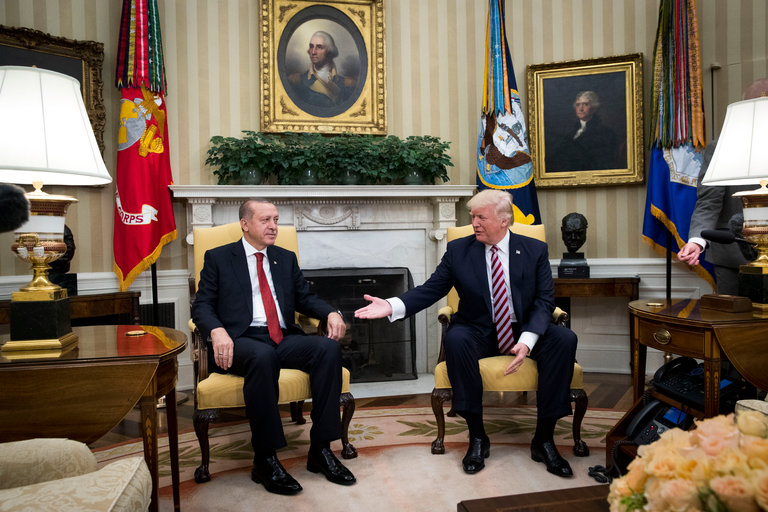Exactly 4 years ago, Turkey’s powerful captain, Recep Tayyip Erdogan, flanked with his foreign minister and spy chief, sat in the White House’s Red Room, as former President Barack Obama scolded him for turning a blind eye to thousands of foreign fighters crossing from Turkey into Syria to join radical groups.
Since then, Mr. Erdogan had an uneasy relationship with his former U.S. counterpart, who previously called him a “good friend.” When President Obama left office, Turkish leaders were euphoric. In President Donald J. Trump, Turks view a like-minded leader they can closely work with, a president who would not lecture Turkey about its dismal human rights record.
“[Trump] is a very good president,” Turkish prime minister Binali Yildirim said on Monday, a day before Mr. Erdogan was to arrive in Washington to meet with the U.S. president.
Four months into Mr. Trump’s presidency, however, Turkey is still frustrated that its expectations have not yet been met. Turkey believes that as President Trump is slowly consolidating his grip on the government and getting rid of “Obama holdovers,” such as Manhattan attorney Preet Bharara, Mr. Trump will be on the same page with Turkey.
“Not now, maybe later,” Mr. Yildirim said, “this administration will understand [Turkey’s] situation better.”
Mr. Yildirim’s remarks illustrate a prevailing sense of hope that Turkish leaders hold about Mr. Trump. “He learns fast and makes decisions fast,” Turkish prime minister added.
President Erdogan said last week that he sees the meeting with Mr. Trump as a “new beginning” in relations that stalled in the past year. The Turkish president was quick to blame the “transition period” for current disagreements on many fronts, particularly Syria.
President Trump’s approval to send heavier arms to YPG militants adds a further layer of complexity to the conflict in Syria, now in its 7th year. Just 3 weeks before Mr. Trump’s decision, Turkey bombed a Syrian Kurdish militants, drawing criticism from Washington that the air campaign put American troops at risk.
“The U.S. opposition to the Turkish strikes is based on the fact that the Turks only provided an hour’s advance notice of the strikes, which defense officials have stated is insufficient time for the coalition to relocate forces,” Jennifer Cafarella, Lead Intelligence Planner at the Institute for the Study of War, told The Globe Post.
“The five Peshmerga fighters killed on the Iraqi side of the border demonstrate this,” she added.
Turkish air campaign revealed how reckless Turkey could be in dealing with Syrian Kurdish fighters, putting Washington between a rock and a hard place. Mr. Erdogan’s chief aide even said Turkey may hit U.S. troops patrolling Kurdish areas. It was Ankara’s calculation that the U.S. won’t choose a militant group over the longstanding NATO ally.
“President Trump is wrong and his Pentagon is being very short sighted,” Luke Coffey, director of the Douglas and Sarah Allison Center for Foreign Policy at The Heritage Foundation, told The Globe Post. “The USA is playing with fire by supporting the YPG. I’m not sure why anyone would think it is a good idea to arm the Syrian branch of the PKK — which is a group designated as a terrorist organization by the State Department.”
Earlier this month, Mr. Erdogan said he will show photos of U.S. troops in Kurdish-held territories in northern Syria to President Trump — a situation that he said is “disturbing” for Turkey. Mr. Erdogan’s primary argument was that Obama holdovers in the Pentagon are still having too much sway over the White House.
Asked if there is a policy divide between the Pentagon and the White House with respect to Syria, Pentagon spokesperson Eric Pahon said: The answer is a flat-out “no.”
On Tuesday during the meeting, the Turkish president will try to convince his U.S. counterpart that his current military campaign in Syria against the Islamic State is flawed and that Turkey is a friendly nation that he would not want to lose.
“In fact,” Mr. Pahon said, “the White House has delegated additional authorities to the [Department of Defense], and subsequently, military commanders on the ground, which shows to me increased trust — the opposite of a divide.”
Ms. Cafarella said the U.S. certainly has a strategic level problem with Turkey that warrants a White House level response, but it remains unclear whether the Trump administration will order a change in the defense and state department’s current course.
“Erdogan is obviously trying to coerce a change in the campaign plan to seize Raqqa, but has not yet succeeded,” Ms. Cafarella said, adding that Mr. Trump will likely decide his next steps with respect to Turkey after his meeting with Mr. Erdogan.
Mr. Trump’s meeting with the Turkish president is a kind of test for the new U.S. president in how he is going to deal with a bullish foreign leader. Mr. Erdogan will possibly do whatever it takes to avert what is increasingly looking like a disappointing start to relations between the two leaders.
Mr. Erdogan’s demands on Syria is in contrast to President Trump’s vow for a quick victory against ISIS. The Pentagon insists that Syrian Kurdish fighters are the most effective and reliable ground troops the U.S. could work with.
Robert Ford, a former U.S. ambassador to Syria, wrote in The Atlantic that Mr. Trump will “pay the larger bills now coming due” as a result of U.S. support of YPG militias. “America’s difficulties will be even worse if Turkey stokes further anti-PYD-YPG sentiment in this Arab-majority region. Thus, we will need to cut a deal with Erdogan,” Mr. Ford added.
Mr. Coffey echoed similar concerns. “Frankly, if the price for taking Raqqa quickly is arming YPG then I don’t think it’s a price worth paying. It seems we always get knee deep into this stuff without ever considering the second and third order effects.”
********
This article was possible thanks to your donations. Please keep supporting us here.






















